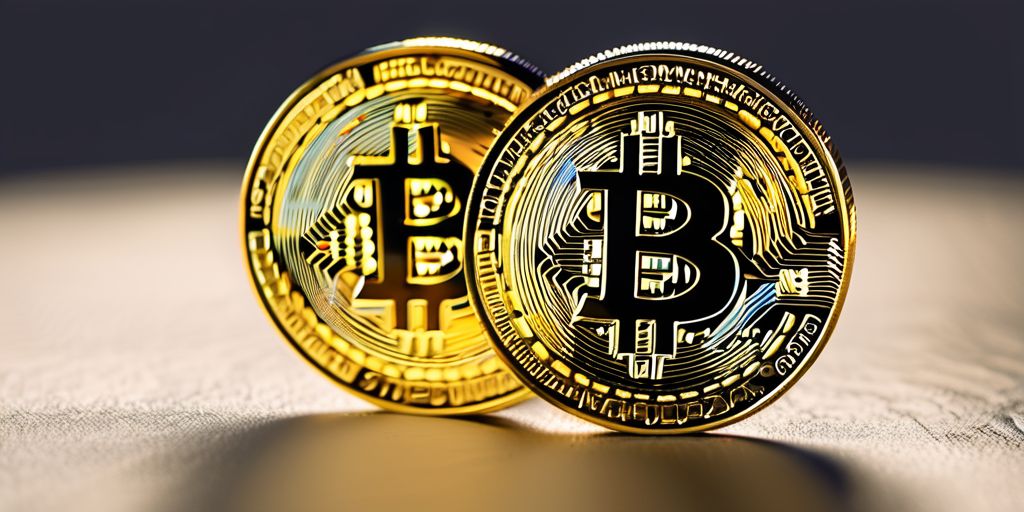Bitcoin and gold bullion are two widely discussed investment options that have gained significant attention in recent years. While both have their unique characteristics and advantages, they also have distinct differences that make them appealing to different types of investors. This article aims to provide a comprehensive comparison between Bitcoin and gold bullion, exploring their origins, key differences, advantages and disadvantages, and their roles in investment portfolios. By understanding the features and considerations of both assets, investors can make informed decisions about incorporating Bitcoin or gold bullion into their investment strategies.
Key Takeaways
- Bitcoin is a digital currency, while gold bullion is a traditional physical asset.
- Bitcoin offers advantages such as decentralization, fast transactions, and potential high returns, but it also comes with disadvantages like volatility and regulatory uncertainties.
- Gold bullion has a long history as a store of value, provides stability in times of economic uncertainty, and is widely recognized as a safe haven asset, but it lacks the convenience and accessibility of digital currencies.
- Investors should consider factors such as risk tolerance, investment goals, and portfolio diversification when deciding between Bitcoin and gold bullion.
- Combining Bitcoin and gold bullion in an investment portfolio can provide diversification benefits and hedge against different types of risks.
Understanding Bitcoin and Gold Bullion
The Origins and History of Bitcoin
Bitcoin, the first decentralized cryptocurrency, was created in 2009 by an anonymous person or group of people using the pseudonym Satoshi Nakamoto. It was developed as a response to the global financial crisis and aimed to provide an alternative to traditional banking systems. Bitcoin operates on a technology called blockchain, which is a distributed ledger that records all transactions and ensures their security and transparency.
Since its inception, Bitcoin has experienced significant growth and adoption. It has gained attention from both individual investors and institutional players, with many considering it a digital store of value and a hedge against inflation.
While Bitcoin has made headlines for its price volatility, it has also demonstrated resilience and the ability to recover from market downturns. This has contributed to its reputation as a viable investment asset.
However, it is important to note that Bitcoin’s history is relatively short compared to gold bullion, which has been used as a store of value for centuries. Gold has a long-standing track record of preserving wealth and has been recognized as a safe haven asset in times of economic uncertainty.
In summary, while Bitcoin has emerged as a prominent player in the investment landscape, gold bullion’s history and reputation as a store of value cannot be overlooked.
The Origins and History of Gold Bullion
Gold bullion, an emblem of wealth and prosperity, has a rich and intricate history that spans thousands of years and multiple civilizations. It has been valued and sought after for its rarity, durability, and beauty. Gold bullion has played a significant role in the development of economies and the establishment of monetary systems. Throughout history, gold bullion has been used as a medium of exchange, a store of value, and a symbol of power and prestige. It has been treasured by ancient civilizations such as the Egyptians, Greeks, and Romans, and it continues to hold its allure in the modern world. Gold bullion has stood the test of time and remains a reliable and tangible investment option for those seeking stability and long-term wealth preservation.
Key Differences between Bitcoin and Gold Bullion
Gold bullion and Bitcoin have several key differences that make them unique investment options. Firstly, gold bullion is a tangible asset that has been valued for centuries, while Bitcoin is a digital currency that exists solely in the virtual world. This fundamental difference gives gold bullion a sense of stability and trust that Bitcoin lacks.
Secondly, gold bullion is widely recognized and accepted as a form of payment and store of value across the globe. On the other hand, Bitcoin is still in the early stages of adoption and is not yet widely accepted as a mainstream form of currency.
Additionally, gold bullion has a long history of being a safe haven investment during times of economic uncertainty. It has proven to retain its value and act as a hedge against inflation. Bitcoin, on the other hand, is known for its extreme volatility and price fluctuations, making it a riskier investment option.
In terms of accessibility, gold bullion can be easily purchased and stored physically, providing investors with a tangible asset that they can physically possess. Bitcoin, on the other hand, requires a digital wallet and relies on technology for storage and transactions.
Lastly, gold bullion is not subject to the same level of regulation and potential security risks as Bitcoin. While Bitcoin offers the advantage of decentralization and anonymity, it also opens up the possibility of hacking and theft.
In conclusion, gold bullion offers a time-tested and reliable investment option with a long history of value retention and stability. Its tangible nature, global recognition, and safe haven status make it an attractive choice for investors looking for a secure store of value.
The Role of Bitcoin and Gold Bullion in Investment Portfolios
In the landscape of investment, the primary objective is to achieve returns that surpass the rate of inflation, all while considering the impact of taxes on the overall investment strategy. While Bitcoin has gained attention in recent years, it is important not to overlook the enduring value of gold bullion in investment portfolios. Gold has a long history as a store of value and has proven to be a reliable hedge against inflation and economic uncertainty. It offers stability and diversification, making it an essential component of a well-rounded investment portfolio.
Bitcoin: A Digital Currency
How Bitcoin Works
Bitcoin operates on a decentralized network called blockchain, which is a public ledger that records all transactions. This technology ensures transparency and security, as each transaction is verified by multiple participants in the network. Bitcoin is created through a process called mining, where powerful computers solve complex mathematical problems to validate transactions and add them to the blockchain. This process also introduces new bitcoins into circulation.
One of the key advantages of Bitcoin is its limited supply. There will only ever be 21 million bitcoins in existence, which makes it a scarce asset. This scarcity is one of the factors that contribute to its value as a store of wealth.
Bitcoin transactions are pseudonymous, meaning that they are not directly linked to the identities of the individuals involved. Instead, each transaction is associated with a unique address, which helps protect the privacy of users. However, it’s important to note that Bitcoin transactions are not completely anonymous, as the blockchain records all transactions and addresses, which can be analyzed to trace the flow of funds.
Bitcoin has gained popularity as a digital currency and a speculative investment. Its price has experienced significant volatility and price fluctuations, which can present both opportunities and risks for investors. While some see the potential for substantial returns, others caution against the inherent uncertainty and speculative nature of Bitcoin. It’s important for investors to carefully consider their risk tolerance and investment goals before entering the Bitcoin market.
In summary, Bitcoin operates on a decentralized network, uses blockchain technology for transparency and security, and is created through the process of mining. Its limited supply and pseudonymous transactions contribute to its value as a store of wealth. However, the volatile nature of Bitcoin’s price should be carefully considered by investors.
Advantages and Disadvantages of Bitcoin
Bitcoin has gained significant attention in recent years as a digital currency with the potential for high returns. However, it is important to consider the advantages and disadvantages of investing in Bitcoin before making any decisions.
Advantages of Bitcoin
- Potential for high returns: Bitcoin has experienced significant price increases in the past, leading to substantial profits for early investors.
- Decentralized nature: Bitcoin operates on a decentralized network, meaning that it is not controlled by any central authority or government.
- Global accessibility: Bitcoin can be accessed and used by anyone with an internet connection, regardless of their location.
Disadvantages of Bitcoin
- Volatility: Bitcoin is known for its price volatility, with significant price fluctuations occurring within short periods of time.
- Limited acceptance: While Bitcoin has gained acceptance in some sectors, it is still not widely accepted as a form of payment.
- Regulatory uncertainty: The regulatory environment surrounding Bitcoin is still evolving, which can create uncertainty for investors.
It is important to carefully consider these factors and conduct thorough research before investing in Bitcoin.
Bitcoin’s Volatility and Price Fluctuations
Bitcoin’s price history has been volatile, experiencing significant spikes and crashes. The currency’s value reached its highest level in November 2021, surpassing $67,802. In 2023, Bitcoin saw a jump of $25,506, reaching $42,208. However, it is important to note that Bitcoin’s price is subject to fluctuations and can be influenced by various factors. Despite its potential for high returns, investors should be aware of the risks associated with investing in Bitcoin.
Gold Bullion: A Traditional Investment
The Value and Significance of Gold Bullion
Gold bullion refers to physical gold that is in the form of bars, coins, or ingots. It is considered a precious metal and is valued based on its purity and weight. Gold bullion has been a symbol of wealth and prosperity for centuries, with its value often increasing during times of economic uncertainty. Investors turn to gold bullion as a safe haven asset, as it is not subject to the same risks as other investments. The demand for gold bullion remains strong, particularly in the United Kingdom, where it is seen as a reliable store of value. Investing in gold bullion can provide diversification and stability to an investment portfolio.
Advantages and Disadvantages of Gold Bullion
While there are some advantages to investing in gold bullion, it is important to consider the disadvantages as well. One of the main disadvantages is the difficulty in getting fair value when buying or selling physical bullion. Gold dealers often build in their own pricing margins, resulting in higher costs for buyers and lower returns for sellers. Additionally, storage fees and transaction fees can be a concern for those looking to trade gold. Another disadvantage is that gold has historically provided lower returns compared to other investments, such as the S&P 500 index. It lacks the power of diversification that other investment options offer. It is important for investors to conduct their own research and consider these factors before making an investment decision.
Gold Bullion’s Role in Global Economy
Gold bullion plays a crucial role in the global economy. It has been a trusted store of value for centuries, providing stability and security in times of economic uncertainty. Unlike fiat currencies, which can be subject to inflation and devaluation, gold bullion maintains its worth over time. This makes it an attractive investment option for individuals and institutions alike. Additionally, gold bullion is highly liquid and accessible, allowing investors to easily buy and sell it as needed. Its universal recognition and acceptance make it a valuable asset in international trade and commerce.
Comparing Bitcoin and Gold Bullion
Store of Value: Bitcoin vs Gold Bullion
When it comes to store of value, gold bullion has a long-standing reputation as a reliable asset. Unlike Bitcoin, which is a relatively new digital currency, gold bullion has been used as a store of value for centuries. Its value is not dependent on any central authority or technological infrastructure, making it a stable and tangible investment.
Gold bullion also has the advantage of being a physical asset that can be held and stored securely. This provides investors with a sense of security and peace of mind, knowing that their wealth is not solely dependent on the performance of a digital currency.
In addition, gold bullion has a proven track record of preserving wealth over time. It has been a store of value during times of economic uncertainty and has maintained its purchasing power throughout history.
Overall, gold bullion offers a time-tested and reliable store of value, making it an attractive investment option for those seeking stability and security in their portfolios.
Liquidity and Accessibility: Bitcoin vs Gold Bullion
When it comes to liquidity and accessibility, gold bullion has a clear advantage over Bitcoin. Gold bullion has a long history as a widely accepted form of currency and store of value, making it highly liquid and easily tradable. It is recognized and valued worldwide, allowing investors to buy and sell gold bullion in various forms, such as bars or coins, through reputable dealers and exchanges. Additionally, gold bullion can be easily stored and transported, providing investors with physical ownership and control over their assets. On the other hand, Bitcoin’s liquidity is still developing and its accessibility is limited to digital platforms and exchanges. While Bitcoin offers the convenience of instant transactions and borderless transfers, it lacks the widespread acceptance and stability that gold bullion provides.
Security and Storage: Bitcoin vs Gold Bullion
When it comes to security and storage, gold bullion has a clear advantage over Bitcoin. Gold bullion is a physical asset that can be stored in secure vaults or kept in a personal safe. This provides a tangible sense of security for investors, knowing that their wealth is protected by a physical object.
On the other hand, Bitcoin is a digital currency that exists only in the virtual world. While it is stored in digital wallets, these wallets are susceptible to hacking and theft. There have been numerous cases of Bitcoin exchanges being hacked and millions of dollars worth of Bitcoin being stolen.
In addition, the storage of Bitcoin requires technical knowledge and expertise. Users need to understand how to properly secure their wallets and protect their private keys. This adds an extra layer of complexity and risk compared to the simple act of storing physical gold bullion.
In summary, gold bullion offers a higher level of security and peace of mind for investors compared to Bitcoin.
Investing in Bitcoin and Gold Bullion
Factors to Consider when Investing in Bitcoin
When considering investing in Bitcoin, it is important to evaluate several factors to make an informed decision. Volatility is a key consideration, as Bitcoin has a history of significant price fluctuations. While this volatility can present opportunities for high returns, it also carries a higher level of risk compared to more stable investments like gold bullion.
Another factor to consider is regulation. Bitcoin operates in a relatively unregulated market, which can lead to uncertainties and potential risks. On the other hand, gold bullion is a well-established and regulated investment, providing a sense of security and stability.
Additionally, liquidity is an important aspect to evaluate. Bitcoin offers high liquidity, allowing for easy buying and selling of the cryptocurrency. However, gold bullion also provides liquidity, as it can be easily converted into cash or traded on the global market.
Lastly, it is crucial to consider long-term value. While Bitcoin has shown impressive growth in recent years, gold bullion has stood the test of time as a store of value. Gold has been used as a form of currency and a store of wealth for centuries, making it a reliable long-term investment.
In summary, when investing in Bitcoin, it is essential to carefully assess the volatility, regulation, liquidity, and long-term value. While Bitcoin may offer potential high returns, gold bullion provides stability, security, and a proven track record as a valuable investment.
Factors to Consider when Investing in Gold Bullion
When considering investing in gold bullion, there are several important factors to keep in mind:
-
Fair Value: It can be challenging to get fair value when buying or selling physical bullion. Gold dealers often include pricing margins, resulting in higher purchase prices and lower selling prices compared to the spot price of gold.
-
Storage and Insurance: Unlike other investments, gold bullion needs to be kept safe and insured. This can incur significant costs, especially for larger quantities of gold.
-
Liquidity: While gold is a highly liquid asset, it may not be as easily accessible as other investments. Selling gold bullion can take time and effort, and there may be additional fees involved.
-
Market Volatility: Gold prices can be subject to significant fluctuations, which can impact the value of your investment. It’s important to consider your risk tolerance and investment goals when investing in gold bullion.
In conclusion, while gold bullion has its merits as a tangible asset, it’s crucial to carefully evaluate these factors before making an investment decision. By understanding the potential challenges and costs associated with gold bullion, investors can make informed choices that align with their financial goals.
Diversification Strategies: Bitcoin and Gold Bullion
Diversification is a crucial aspect of investment portfolios, and when it comes to diversifying, gold bullion offers a reliable and time-tested option. While Bitcoin has gained significant attention in recent years, gold bullion remains a steadfast choice for investors looking to mitigate risk and preserve wealth.
Here are some key reasons why gold bullion is an essential component of a diversified portfolio:
- Historical Stability: Gold bullion has a long history of maintaining its value, even during times of economic uncertainty. It has served as a store of wealth for centuries, providing a hedge against inflation and currency fluctuations.
- Tangible Asset: Unlike Bitcoin, which is a digital currency, gold bullion is a physical asset that can be held and touched. This tangible nature adds a sense of security and peace of mind for investors.
- Global Acceptance: Gold bullion is recognized and accepted worldwide as a form of currency and a store of value. It is not dependent on any specific country or government, making it a truly global asset.
Incorporating gold bullion into an investment portfolio alongside other assets, such as stocks and bonds, can help reduce overall risk and increase the potential for long-term returns. By diversifying with gold bullion, investors can benefit from its stability, tangibility, and global acceptance.
Conclusion
In the ongoing debate between Bitcoin and gold bullion, it is clear that both assets have their unique advantages and drawbacks. While gold has long been considered a safe haven investment and a store of value, Bitcoin offers the potential for high returns and a decentralized financial system. The recent outflow of gold and the increasing interest in Bitcoin suggest a shift in investor sentiment. However, it is important to note that both assets come with risks and uncertainties. Investors should carefully consider their investment goals and risk tolerance before making a decision. Ultimately, the choice between Bitcoin and gold bullion depends on individual preferences and market conditions.
Frequently Asked Questions
What is Bitcoin?
Bitcoin is a decentralized digital currency that allows for secure and anonymous transactions.
What is Gold Bullion?
Gold Bullion refers to gold bars, coins, or ingots that are valued primarily for their precious metal content.
How does Bitcoin work?
Bitcoin works on a technology called blockchain, which is a distributed ledger that records all transactions.
What are the advantages of Bitcoin?
Some advantages of Bitcoin include fast and low-cost transactions, global accessibility, and protection against inflation.
What are the advantages of Gold Bullion?
Gold Bullion is a tangible asset that has been used as a store of value for centuries and can act as a hedge against economic uncertainties.
How do I invest in Bitcoin and Gold Bullion?
You can invest in Bitcoin and Gold Bullion through various platforms, such as cryptocurrency exchanges and precious metal dealers.











